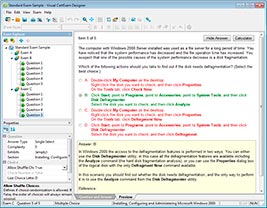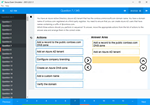Download Oracle Database 11g SQL Fundamentals I.1z0-051.TestKing.2018-03-08.153q.tqb
| Vendor: | Oracle |
| Exam Code: | 1z0-051 |
| Exam Name: | Oracle Database 11g SQL Fundamentals I |
| Date: | Mar 08, 2018 |
| File Size: | 12 MB |
How to open TQB files?
Files with TQB (Taurus Question Bank) extension can be opened by Taurus Exam Studio.
Purchase
Coupon: TAURUSSIM_20OFF
Discount: 20%
Demo Questions
Question 1
View the Exhibit and examine the structure of the CUSTOMERS table.

NEW_CUSTOMERS is a new table with the columns CUST_ID, CUST_NAME and CUST_CITY that have the same data types and size as the corresponding
columns in the CUSTOMERS table.
Evaluate the following INSERT statement:

The INSERT statement fails when executed. What could be the reason?
- The VALUES clause cannot be used in an INSERT with a subquery
- The total number of columns in the NEW_CUSTOMERS table does not match the total number of columns in the CUSTOMERS table
- The WHERE clause cannot be used in a sub query embedded in an INSERT statement
- Column names in the NEW_CUSTOMERS and CUSTOMERS tables do not match
Correct answer: A
Explanation:
Copying Rows from Another Table Write your INSERT statement with a subquery:Do not use the VALUES clause. Match the number of columns in the INSERT clause to those in the subquery. Inserts all the rows returned by the subquery in the table, sales_reps. Copying Rows from Another Table
Write your INSERT statement with a subquery:
Do not use the VALUES clause.
Match the number of columns in the INSERT clause to those in the subquery.
Inserts all the rows returned by the subquery in the table, sales_reps.
Question 2
View the Exhibit and examine the description for the CUSTOMERS table.

You want to update the CUST_CREDIT_LIMIT column to NULL for all the customers, where
CUST_INCOME_LEVEL has NULL in the CUSTOMERS table. Which SQL statement will accomplish the task?
- UPDATE customersSET cust_credit_limit = NULLWHERE CUST_INCOME_LEVEL = NULL;
- UPDATE customersSET cust_credit_limit = NULLWHERE cust_income_level IS NULL;
- UPDATE customersSET cust_credit_limit = TO_NUMBER(NULL)WHERE cust_income_level = TO_NUMBER(NULL);
- UPDATE customersSET cust_credit_limit = TO_NUMBER(' ',9999)WHERE cust_income_level IS NULL;
Correct answer: B
Question 3
Which two statements about sub queries are true? (Choose two.)
- A sub query should retrieve only one row.
- A sub query can retrieve zero or more rows.
- A sub query can be used only in SQL query statements.
- Sub queries CANNOT be nested by more than two levels.
- A sub query CANNOT be used in an SQL query statement that uses group functions.
- When a sub query is used with an inequality comparison operator in the outer SQL statement, the column list in the SELECT clause of the sub query should contain only one column.
Correct answer: BF
Explanation:
sub query can retrieve zero or more rows, sub query is used with an inequality comparison operator in the outer SQL statement, and the column list in the SELECT clause of the sub query should contain only one column. Incorrect answer:Asub query can retrieve zero or more rows Csub query is not SQL query statement Dsub query can be nested Egroup function can be use with sub query sub query can retrieve zero or more rows, sub query is used with an inequality comparison operator in the outer SQL statement, and the column list in
the SELECT clause of the sub query should contain only one column.
Incorrect answer:
Asub query can retrieve zero or more rows
Csub query is not SQL query statement
Dsub query can be nested
Egroup function can be use with sub query
Question 4
View the Exhibit and examine the structure of the PROMOTIONS table.

You have to generate a report that displays the promo name and start date for all promos that started after the last promo in the 'INTERNET' category.
Which query would give you the required output?
- SELECT promo_name, promo_begin_date FROM promotionsWHERE promo_begin_date > ALL (SELECT MAX(promo_begin_date) FROM promotions )ANDpromo_category = 'INTERNET';
- SELECT promo_name, promo_begin_date FROM promotionsWHERE promo_begin_date IN (SELECT promo_begin_dateFROM promotionsWHEREpromo_category='INTERNET');
- SELECT promo_name, promo_begin_date FROM promotionsWHERE promo_begin_date > ALL (SELECT promo_begin_dateFROM promotionsWHEREpromo_category = 'INTERNET');
- SELECT promo_name, promo_begin_date FROM promotionsWHERE promo_begin_date > ANY (SELECT promo_begin_dateFROM promotionsWHEREpromo_category = 'INTERNET');
Correct answer: C
Question 5
Which are /SQL*Plus commands? (Choose all that apply.)
- INSERT
- UPDATE
- SELECT
- DESCRIBE
- DELETE
- RENAME
Correct answer: D
Explanation:
Describe is a valid iSQL*Plus/ SQL*Plus command. INSERT, UPDATE & DELETE are SQL DML Statements. A SELECT is an ANSI Standard SQL Statement not an iSQL*Plus Statement. RENAME is a DDL Statement. Describe is a valid iSQL*Plus/ SQL*Plus command.
INSERT, UPDATE & DELETE are SQL DML Statements. A SELECT is an ANSI Standard SQL Statement not an iSQL*Plus Statement.
RENAME is a DDL Statement.
HOW TO OPEN VCE FILES
Use VCE Exam Simulator to open VCE files

HOW TO OPEN VCEX FILES
Use ProfExam Simulator to open VCEX files


ProfExam at a 20% markdown
You have the opportunity to purchase ProfExam at a 20% reduced price
Get Now!



